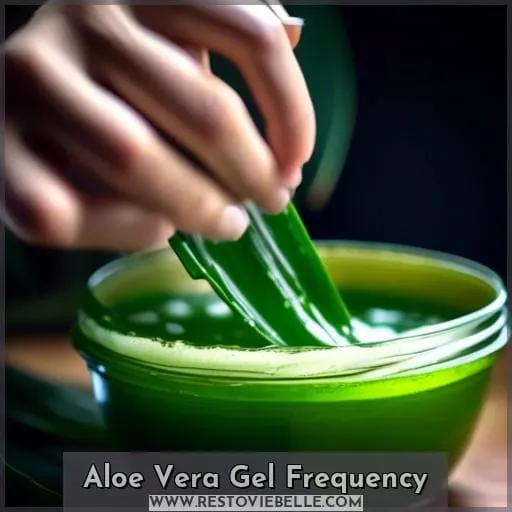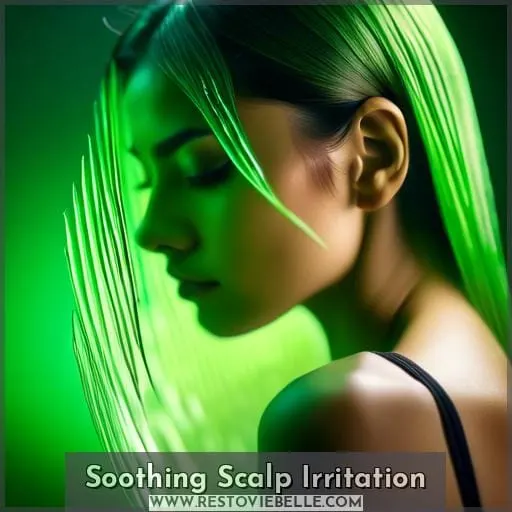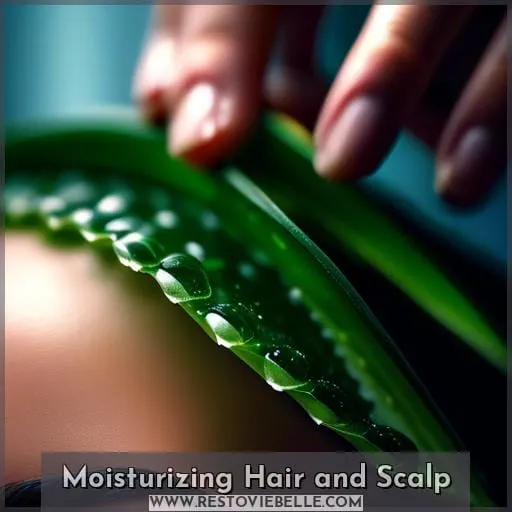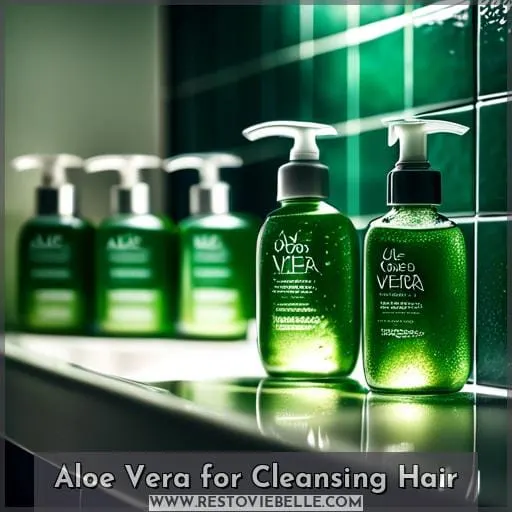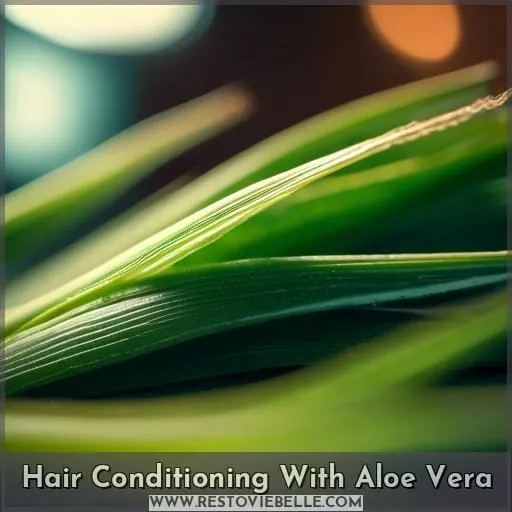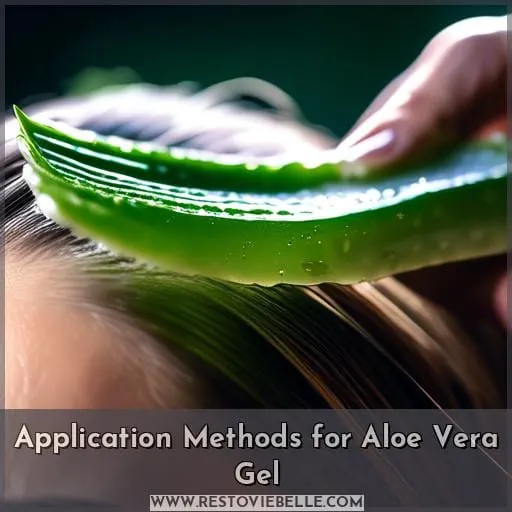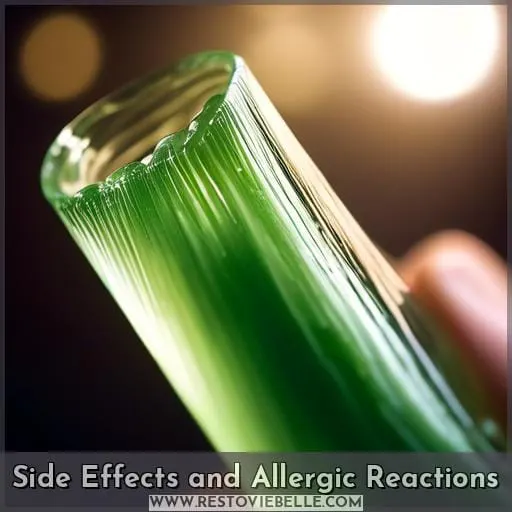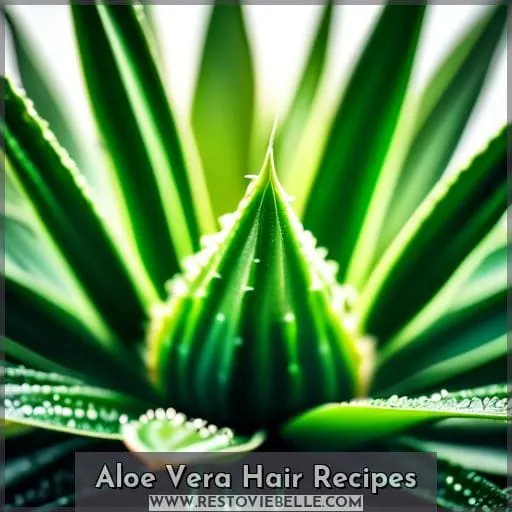This site is supported by our readers. We may earn a commission, at no cost to you, if you purchase through links.
 Imagine Cleopatra’s secret to lustrous locks, or the ancient Greeks’ tonic for tresses, and you’ve got aloe vera—a timeless ally for hair health.
Imagine Cleopatra’s secret to lustrous locks, or the ancient Greeks’ tonic for tresses, and you’ve got aloe vera—a timeless ally for hair health.
You’re right to consider aloe vera gel for your haircare routine; its hydrating and soothing properties can be a daily boon for your strands.
Whether you’re looking to soothe an irritated scalp, lock in moisture, or simply add a natural sheen, aloe vera gel is versatile and gentle enough for everyday use.
Dive into the world of aloe vera for hair and discover how this plant can be part of your journey to stronger, healthier hair.
Yes, you can use aloe vera gel on your hair every day as it is rich in essential nutrients like vitamins A, B, C, and E, which promote healthy hair growth and provide hydration. However, it’s important to note that individual responses to aloe vera can vary, so it’s recommended to start with a small amount to see how your hair and scalp react.
Table Of Contents
- Key Takeaways
- Aloe Vera Gel Frequency
- Soothing Scalp Irritation
- Moisturizing Hair and Scalp
- Aloe Vera for Cleansing Hair
- Hair Conditioning With Aloe Vera
- Aloe Vera’s Role in Hair Growth
- Application Methods for Aloe Vera Gel
- Side Effects and Allergic Reactions
- Aloe Vera Hair Recipes
- Frequently Asked Questions (FAQs)
- Can aloe vera gel affect hair dye or treated hair in any way?
- Is aloe vera gel effective in treating hair that has been chemically straightened or permed?
- How does aloe vera gel interact with other hair care products, such as serums or heat protectants?
- Can aloe vera gel be used on hair extensions or wigs made of natural hair?
- Are there any specific hair types or textures that should avoid using aloe vera gel?
- Conclusion
Key Takeaways
- Aloe vera gel can be used daily on hair for those seeking to hydrate and nourish their hair, but it’s important to be mindful of potential allergic reactions or irritation.
- While aloe vera offers numerous benefits such as moisturizing hair, reducing dandruff, and promoting hair growth, using it excessively on the scalp is not recommended.
- For individuals with dry hair, applying aloe vera gel daily can be beneficial, whereas those with greasy hair might consider using it less frequently to avoid buildup.
- Always perform a patch test before using aloe vera extensively to ensure you’re not allergic, as reactions can include redness, itching, or scaling.
Aloe Vera Gel Frequency
When it comes to using aloe vera gel for hair care, it’s important to understand the best application methods and frequency to ensure hair nourishment without causing any adverse effects. Aloe vera gel is known for its moisturizing and soothing properties, which can be beneficial for the hair and scalp.
However, daily usage safety is a concern, as overuse can potentially lead to build-up or scalp sensitivity.
For optimal hair growth expectations, incorporating aloe vera gel into your hair care routine 1-2 times per week is generally recommended. This frequency allows you to reap the benefits of the gel’s vitamins and minerals, which contribute to hair strength and scalp health, without overwhelming your hair.
DIY hair masks are a popular way to use aloe vera gel for hair nourishment. You can create your own masks by mixing aloe vera with ingredients like coconut oil, honey, or essential oils to address specific hair concerns.
When applying these masks, ensure that you cover your hair and scalp evenly and leave the mixture on for the suggested amount of time before rinsing.
Regarding aloe vera storage, fresh aloe vera gel can be kept in a sealed container in the fridge for up to a week, or it can be frozen for longer storage. This ensures that you always have fresh gel on hand for your hair care treatments.
Lastly, be mindful of any signs of irritation or allergic reactions. If you experience redness, itching, or scaling, it’s best to discontinue use and consult a doctor if necessary.
Soothing Scalp Irritation
If you’re dealing with an itchy scalp, dryness, or conditions like seborrheic dermatitis, aloe vera might be a soothing solution for you. This plant is renowned for its calming and anti-inflammatory properties, which can alleviate scalp irritation and dandruff.
Aloe vera’s moisturizing qualities also contribute to hair hydration, helping to maintain scalp health and prevent dryness.
When your scalp feels irritated, applying aloe vera gel can provide immediate relief from itchiness and discomfort. It’s particularly beneficial for those suffering from scalp conditions like eczema or scalp dermatitis, as it can help reduce inflammation and soothe the skin.
Moreover, aloe vera’s natural enzymes can help moisturize the scalp, potentially reducing flakiness and promoting a healthier hair environment.
While aloe vera can support hair conditioning and moisturizing, it’s important to note that it won’t necessarily speed up hair growth. However, by maintaining a healthy scalp and properly hydrated hair, it may create a conducive environment for hair growth.
Remember to use aloe vera judiciously, as overuse can lead to buildup or potential irritation for those with sensitive skin.
For those looking to incorporate aloe vera into their hair care routine, consider using it as a pre-poo treatment, a detangler, or as part of a hair mask. You can apply the gel directly from the plant or use hair products that contain aloe vera.
If you experience any redness, itching, or scaling after using aloe vera, it’s advisable to consult a doctor and discontinue use if you’re allergic.
Moisturizing Hair and Scalp
Aloe vera is renowned for its hydrating properties, making it an excellent choice for moisturizing both hair and scalp. Its high water content acts as a humectant, providing essential nutrients to hair follicles and promoting a healthy environment for hair growth.
-
Hydration and Nourishment: Aloe vera extracts contain vitamins and minerals that nourish the hair, maintaining scalp health and preventing dryness.
-
Scalp Health: The anti-inflammatory properties of aloe vera can soothe scalp irritation and reduce dandruff, contributing to overall hair health.
-
Protection and Repair: Aloe vera helps protect hair from UV damage and repairs hair strands, reducing split ends and improving hair cuticle health.
When using aloe vera as a hair moisturizer, it’s important to consider the frequency of application. While aloe vera is beneficial, it’s not recommended for daily use on the scalp to avoid potential buildup or over-saturation.
Instead, applying aloe vera gel 1-2 times per week is sufficient to reap its moisturizing benefits without risking adverse effects. If you experience any stickiness, rinsing the hair after 30 minutes can help. Always be mindful of any signs of irritation or allergic reactions, and consult a doctor if necessary.
Aloe Vera for Cleansing Hair
After exploring how aloe vera can deeply moisturize your hair and scalp, let’s delve into another of its remarkable uses: hair cleansing. Aloe vera benefits your hair care routine by acting as a gentle hair cleanser, effectively removing oils and dirt from your scalp and strands without stripping them of their natural moisture.
Its natural enzymes help reduce scalp irritation, which can often be exacerbated by harsh shampoos.
Incorporating aloe vera into your regimen can contribute to overall hair hydration, ensuring that your hair remains luscious and less prone to damage. Its hydrating properties are particularly beneficial for those with dry or curly hair, which requires extra nourishment.
Moreover, aloe vera’s rich blend of vitamins and minerals provides your hair with the essential nourishment it needs to maintain health and vitality.
If you’re grappling with hair tangles, aloe vera can also serve as an effective hair detangler, smoothing out the knots without causing breakage. For those concerned about hair loss, the soothing properties of aloe vera can create a healthier scalp environment, potentially aiding in hair regrowth by minimizing inflammation and maintaining scalp health.
With its multifaceted benefits, aloe vera stands out as a versatile and natural addition to your hair care arsenal.
Hair Conditioning With Aloe Vera
Aloe vera is renowned for its soothing and moisturizing properties, which extend to the benefit of hair care. When you use aloe vera for hair conditioning, you’re tapping into a natural remedy that hydrates the scalp and hair, potentially reducing dandruff and flakes.
This plant’s gel contains vitamins A, C, and E, which contribute to cell turnover, promoting healthy cell growth and shiny hair.
If you’re dealing with hair damage, aloe vera can be a gentle yet effective treatment. It’s known to improve hair cuticle health and protect hair from UV rays, which can prevent further damage. For those struggling with split ends, aloe vera’s rich array of nutrients and enzymes can help repair and prevent them.
When it comes to hair growth tips, while aloe vera alone may not speed up the growth rate, its ability to condition and moisturize the hair creates an optimal environment for hair health. Proper hydration is essential for maintaining healthy hair, and aloe vera’s moisturizing effect can support this.
For hair styling and hair treatment, aloe vera can be used in various hair products, from leave-in conditioners to hair masks, offering a natural alternative to chemical-based products. It’s also beneficial for hair detangling, making styling easier and less damaging to the hair.
However, it’s important to note that while aloe vera offers many hair benefits, it shouldn’t be used excessively on the scalp, and it’s not recommended for daily use due to the potential for buildup and the risk of irritation in some individuals.
Always conduct a patch test before using aloe vera to ensure you’re not allergic, and consult a doctor if irritation occurs.
Aloe Vera’s Role in Hair Growth
When considering aloe vera’s role in hair growth, it’s important to understand its potential benefits. Aloe vera may help reduce scalp inflammation, which can create a healthier environment for hair growth.
Additionally, its hydrating properties can improve hair health by moisturizing the scalp and hair. However, while aloe vera can support the overall health of your hair, it’s not a miracle cure for increasing the rate of hair growth.
Using aloe vera gel on your hair regularly can contribute to better scalp health and hair conditioning. It’s recommended to apply aloe vera gel to your hair and scalp 1-2 times per week, and it can be left in the hair if desired or rinsed out after 30 minutes if it causes stickiness.
While aloe vera is beneficial, it’s not advisable to use it every day on the scalp as it may lead to buildup or potential irritation for some individuals.
Reducing Scalp Inflammation
To reduce scalp inflammation and promote hair growth, aloe vera’s moisturizing properties and anti-inflammatory effects play a vital role. By soothing the scalp and hydrating it, aloe vera aids in maintaining scalp health and combating issues like dandruff.
While aloe vera gel can be beneficial for hair protection and overall scalp health, using it daily may not be necessary due to its potent effects. Incorporating aloe vera into your hair care routine, a few times per week, can help harness its benefits without overloading the scalp, ensuring optimal results in reducing inflammation and fostering healthy hair growth.
Hair Hydration
Continuing from the discussion on reducing scalp inflammation, let’s delve into how aloe vera contributes to hair hydration, a key aspect of hair health. Aloe vera’s hydrating properties are essential for maintaining hair vitality. It acts as a physical barrier, locking in moisture and drawing hydration from the environment to your hair.
This hydration is crucial for enhancing hair shine, softness, and smoothness, ultimately leading to a boost in hair vitality.
Regular use of aloe vera can improve hair cuticle health, which not only protects your hair from UV rays but also reduces the occurrence of split ends. By keeping your scalp and hair properly hydrated, aloe vera ensures your hair remains healthy and resilient.
Remember, while aloe vera can condition and moisturize your hair, it’s not a miracle cure for hair growth and should be used as part of a comprehensive hair care routine.
Application Methods for Aloe Vera Gel
Aloe vera gel can be a versatile and beneficial addition to your hair care routine. You can apply it directly to your scalp and hair as a pre-poo treatment to help with detangling and conditioning.
Creating hair masks with aloe vera can provide deep hydration and soothe the scalp. When using aloe vera gel, it’s recommended to apply it 2-3 times a week for the best results.
While it’s not advisable to use aloe vera gel on your hair every day, incorporating it regularly can lead to improved hair health and moisture.
As a Pre-poo Treatment
Using aloe vera as a pre-poo treatment can be a game-changer for your hair care routine. Pre-poo benefits include protecting your hair from the harsh stripping effects of shampoo, adding moisture, and making detangling easier.
To prepare, simply extract the gel from an aloe vera leaf and apply it to your hair and scalp. Suitable for all hair types, this treatment is especially beneficial for those with dry or itchy scalps. You can leave the aloe vera on your hair for about 15 to 30 minutes before shampooing.
For DIY variations, consider blending the gel with oils like coconut or olive for added hydration and nourishment.
Hair Detangling
To ease your detangling time, consider aloe vera’s natural slip. Its hydrating properties can significantly reduce detangling frequency, making the process gentler on your hair.
For optimal detangling benefits, mix aloe vera with a few drops of your favorite oil in a spray bottle.
Remember these detangling tips: always start from the ends and work your way up to prevent breakage.
Creating Hair Masks
Creating your own aloe vera hair masks at home can be a rewarding way to enhance the health and appearance of your hair.
- Choose the right aloe vera gel, prioritizing purity and minimal additives for safety and effectiveness. Look for cold-pressed and organic options when purchasing.
- Mix aloe vera with ingredients like coconut oil or castor oil to add thickness and nourish your hair.
- Store your aloe vera properly to maintain its potency. Fresh gel can be kept in the refrigerator for a short period, or you can freeze it for longer storage.
- Always perform a patch test to ensure you don’t have an allergic reaction to aloe vera or any substitutes you might use.
Side Effects and Allergic Reactions
While aloe vera is widely celebrated for its soothing and moisturizing properties, it’s important to be aware of potential side effects and allergic reactions. Aloe vera allergies aren’t common, but they can occur. If you experience redness, itching, or scaling after applying aloe vera to your hair or scalp, it may be a sign of skin sensitivity or an allergic reaction.
In some cases, the use of aloe vera can lead to more severe reactions such as difficulty breathing or throat tightness, which require immediate medical attention. It’s also worth noting that while aloe vera gel is generally considered safe for topical use, oral ingestion of aloe, especially aloe latex, can have serious health implications, including gastrointestinal discomfort and interactions with medications.
To minimize the risk of adverse reactions, it’s advisable to conduct a patch test before using aloe vera extensively on your hair or scalp. Apply a small amount of the gel to a discreet area of your skin and wait for 24 hours to see if any irritation develops.
If you notice any adverse effects, discontinue use and consult a healthcare provider if necessary.
Aloe Vera Hair Recipes
Aloe vera is a versatile plant known for its benefits for skin and hair health.
When it comes to hair care, incorporating aloe vera into your routine can be particularly beneficial. Whether you’re looking to moisturize dry hair, soothe an irritated scalp, or add a natural shine to your locks, aloe vera can be mixed with ingredients like castor oil, coconut oil, onion juice, green tea, and amla to create nourishing hair masks.
These combinations leverage the hydrating and nutrient-rich properties of aloe vera, alongside the unique benefits of each additional ingredient, to address various hair concerns effectively.
Aloe and Castor Oil
While aloe vera is renowned for its soothing and moisturizing properties, combining it with castor oil can enhance its benefits for hair.
Castor oil is rich in ricinoleic acid, which is known to improve blood circulation to the scalp and promote hair growth. However, it’s important to be aware of the potential side effects of castor oil, which can include scalp irritation in some individuals.
When creating a DIY hair treatment, it’s crucial to use the right castor oil dosage to avoid any adverse effects. Typically, a mixture of aloe vera gel and castor oil can be applied to the hair and scalp to nourish and strengthen hair strands, potentially stimulating hair follicles and supporting hair growth.
Aloe and Coconut Oil
Incorporating aloe vera and coconut oil in your hair care routine offers numerous benefits.
This mixture not only nourishes but also helps maintain hair health, reducing the need for frequent trims. Additionally, it contributes to softer and silkier strands while providing anti-inflammatory properties that promote scalp health and hair growth benefits.
Aloe and Onion Juice
Combining aloe vera with onion juice can be a powerful duo for your hair care routine.
- Curbing hair fall: Onion juice is rich in sulfur, which is known to minimize breakage and thinning.
- Promoting hair regrowth: The sulfur in onions also supports strong, thick hair and can stimulate regrowth of hair follicles.
- Stimulating scalp: Onion juice can enhance blood flow to the scalp, nourishing hair follicles and potentially boosting hair growth.
- Neutralizing scalp damage: Antioxidants in onions can fight free radicals, protecting the scalp from damage.
- Improving hair texture: Aloe vera, with its moisturizing properties, can improve hair texture, making it soft and lustrous.
While these ingredients can be beneficial, it’s important to note that they may cause irritation for some.
Aloe and Green Tea
Combining aloe vera with green tea creates a potent mixture for your hair. This blend leverages the antioxidant properties of green tea to enhance hair growth potential and provide scalp nourishment. It can help prevent hair damage while offering anti-inflammatory effects, which are beneficial for maintaining healthy hair and scalp.
To create a nourishing hair rinse, simply brew green tea, let it cool, and mix with aloe vera gel. Apply it to your hair after shampooing for a refreshing treatment that not only promotes hair growth but also strengthens and protects your strands.
Aloe and Amla
Combining aloe vera and amla offers a potent remedy for various hair concerns, particularly for improving hair texture and preventing hair loss.
- Amla, rich in vitamin C and antioxidants, strengthens hair roots, significantly reducing hair loss and enhancing overall hair growth.
- Aloe vera moisturizes the scalp and hair, providing deep hydration and reducing dryness and frizz.
- Together, they repair hair damage caused by environmental factors like pollution and UV exposure, restoring hair’s natural vitality and shine.
- This combination also maintains scalp health by balancing its pH and combating dandruff, thanks to aloe vera’s antimicrobial properties.
- Regular application of an amla and aloe vera mask can improve hair texture, making it softer, smoother, and more manageable.
For those looking to incorporate these ingredients into their hair care routine, consider creating a simple hair mask by mixing amla powder with aloe vera gel. Apply this mask to your hair and scalp regularly to harness the benefits of these powerful natural ingredients for healthier, stronger hair.
Frequently Asked Questions (FAQs)
Can aloe vera gel affect hair dye or treated hair in any way?
Aloe vera gel can moisturize and condition color-treated hair, potentially enhancing color retention and preventing premature fading.
However, always patch test first to avoid any adverse reactions.
Is aloe vera gel effective in treating hair that has been chemically straightened or permed?
Aloe vera gel, a soothing oasis for your chemically straightened or permed tresses, acts as a gentle guardian, nurturing and hydrating each strand.
Its rich moisture content and anti-inflammatory properties help calm the stormy seas of chemical treatments, restoring balance and vitality to your hair.
While it won’t reverse the effects of chemical processes, incorporating aloe vera into your hair care routine can significantly improve hair texture, reduce scalp irritation, and enhance overall hair health.
So, yes, aloe vera gel can be an effective treatment for hair that has undergone chemical straightening or perming, offering a natural, nourishing embrace to your delicate locks.
How does aloe vera gel interact with other hair care products, such as serums or heat protectants?
Aloe vera gel can be used daily on hair. Apply a thin layer and leave it on for 20-30 minutes. Then rinse it off. This natural remedy hydrates the hair, soothes the scalp, reduces dandruff, and may even stimulate hair growth.
Can aloe vera gel be used on hair extensions or wigs made of natural hair?
You can use aloe vera gel on natural hair extensions and wigs. It moisturizes and adds shine without damaging them.
Are there any specific hair types or textures that should avoid using aloe vera gel?
While aloe vera gel is generally beneficial for hair care, those with low porosity hair might want to steer clear, as it can leave their locks high and dry.
The gel’s acidity and protein-like compounds can prevent moisture penetration, leading to brittleness.
Conclusion
Soothe, moisturize, and grow; with aloe vera gel, you can achieve all three for your hair.
Embrace this natural elixir in your daily routine to quench your hair’s thirst, calm your scalp, and encourage robust growth.
With its rich blend of vitamins and minerals, aloe vera stands as a testament to nature’s power in nurturing your hair to its healthiest state.

